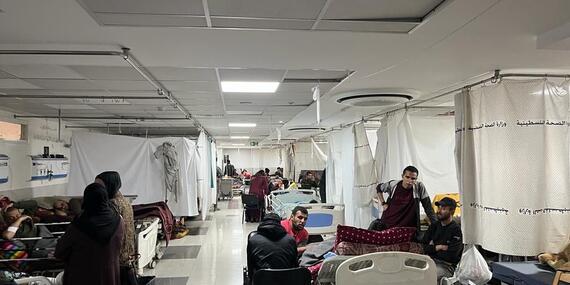Today's top news: Occupied Palestinian Territory, Haiti, Ukraine

Occupied Palestine Territory
OCHA is working with the Palestine Red Crescent Society to assist in the repatriation of the remains of the international staff members from World Central Kitchen who were killed on Monday.
The World Central Kitchen vehicles they were traveling in were struck during the evening hours of April 1st. The UN has suspended night-time movements within the Gaza Strip for 48 hours to allow for further evaluation of the security issues that affect the safety of our personnel and the civilian population.
Meanwhile, the World Health Organization (WHO) reports that today, it once again requested that Israeli authorities facilitate a mission to Al Shifa Hospital in Gaza city. As we told you yesterday, multiple requests to reach the hospital over the past two weeks were denied, delayed or impeded.
At a press briefing earlier today, WHO Director-General Dr. Tedros Adhanom Ghebreyesus said the agency's team in Gaza is eager to reach the hospital to speak with staff and to see what can be saved, following the latest Israeli military siege on the facility.
WHO teams were also planning to visit two other hospitals in northern Gaza today – Sahaba and Ahli. However, they did not receive permissions to move.
We can only underscore once more that delays and denials of humanitarian missions not only prevent us from reaching those in need – they also impact other operations and deliveries by diverting scarce resources.
The UN and our humanitarian partners will continue to do all we can to get life-saving assistance to civilians across Gaza. But as we have stressed again and again, doing so requires that the parties to this conflict – particularly Israel as the occupying power – ensure that aid organizations have safe, timely and reliable access to all those in need, wherever they are.
Haiti
Health facilities in Port-au-Prince metropolitan areas continue to be impacted by the ongoing violence – further restricting access to life-saving care for people in and around the capital.
Two health care facilities – Delmas 18 Hospital and Saint Martin health centre – were looted by armed groups on 26 and 27 March.
La Paix University hospital remains open – and the Pan American Health Organization and WHO continue to support the facility, including with the provision of medicine, medical supplies and fuel. However, due to the closure of the State Hospital in Port-au-Prince, La Paix is facing significant strain amid increased workloads for staff.
Our humanitarian colleagues also report that last week, 10 pharmacies in the capital were looted, making it even more difficult for people to get their medication.
Despite ongoing insecurity, response efforts continue. Yesterday, the World Food Programme distributed hot meals to more than 27,000 people in Port-au-Prince.
Last week, UNICEF, the Pan American Health Organization, and local partners carried out nearly 600 medical consultations in displacement sites through their mobile clinics.
Also last week, UNICEF, the International Organization for Migration, and partners distributed nearly 300,000 litres of water from 23 March through 1 April. Partners have also delivered hygiene kits in displacement sites.
Ukraine
The Humanitarian Coordinator there, Denise Brown, condemned in a statement yesterday the deadly strike that hit Dnipro City, in the east of the country.
Local authorities and humanitarian workers on the ground report that dozens of civilians, including children, were injured. Several education facilities and residential buildings were also damaged.
Aid organizations provided immediate humanitarian assistance, including food and hot meals, as well as psychological and legal support. They also distributed emergency shelter kits to cover damaged windows.
Meanwhile, hostilities yesterday and today in front-line and border areas in eastern, northeastern and southern Ukraine caused several civilian casualties, including children, as well as damage to homes and civilian infrastructure. The regions of Donetsk, Kharkiv, Kherson and Sumy were affected, according to local authorities. Humanitarian workers on the ground are providing support where access is possible.
